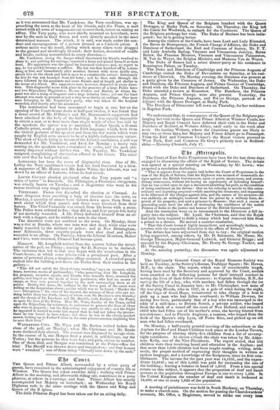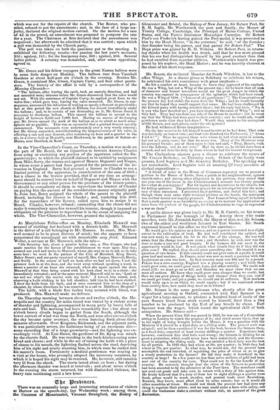Zbe
The Court of East India Proprietors have been for the last three days engaged in discussing the affairs of the Rajah of Sattara. The debate was opened at a special meeting on Wednesday, by Mr. Lewis ; who proposed a resolution declaring,
"That it appears from the papers laid before the Court of Proprietors in the case of the Rajah of Setters, that his Highness was accused of treasonable de- signs against the British Government, upon es parte, anonymous, and contra- dictory statements, without his having an opportunity of defending himself: that he was called upon to sign a document admitting his guilt, as the condition of being continued on his throne : that on his refusing to accede to this extra- ordinary and degrading proposal—while asserting his innocence, and requesting to be informed of the charges against him, and the names of his accusers—he was suddenly, at midnight, removed from his palace by a military force, de- prived of his property, and sent a prisoner to Benares: that such a course of proceeding must have the effect of destroying the confidence of the native Princes of India in the justice and honour of the British Government."
And the resolution went on to recommend to the Directors a fall in- quiry into the subject. Mr. Lyall, the Chairman, said that the Rajah had only been required to fulfil a treaty which had removed him from a prison to a throne. He moved a counter-resolution,
"That this Court deems it highly inexpedient, and accordingly declines, to interfere with the responsible Executive in the affairs of Sattara."
The debate has been adjourned from day to day ; the original motion being supported, among others, by Mr. D. Salomons, Mr. Hume, Mr. George Thompson, Major-General Lodwick, and General Briggs ; and opposed by the Deputy-Chairman, Mr. Henry St. George Tucker, and Mr. Weeding. At the meeting yesterday, the discussion was again adjourned to Monday.
The half-yearly General Court of the Royal Humane Society was held on Tuesday, at the Society's Rooms, Trafalgar Square ; Mr. Hawes, M.P., in the chair. The report, which was of considerable length, having been read by the Secretary and approved by the Court, medals were awarded to the following persons for their intrepid conduct in saving the lives of their fellow creatures : to Captain Stanley, R. N., for saving the life of a boy, who, with another, had fallen through the ice of the Surrey Canal in January last ; to Mr. Christopher, now mate of the war-ship Blonde, who in 1837, in a gale of wind during the night, off the Cape of Good Hope, volunteered to take charge of a boat to pick up a man who had fallen overboard ; to William Downes, for saving five lives, particularly that of a boy who was immerged in the eddy of a mill-dam ; to Dennis Sennit, a private soldier, who leaped from the deck of a vessel off the coast of New Holland, and rescued a child who had fallen out of his mother's arms, she having fainted from sea-sickness ; and to Francis Anglesey, a seaman, who leaped from the deck of the Queen's ship Lyra, off Porto Rico, and picked up an old man who had fallen overboard.
On Monday, a half-yearly general meeting of the subscribers to the Asylum for Deaf and Dumb Children took place at the London Tavern, for the purpose of electing thirty-five children from a list of seventy- eight candidates. At eleven o'clock the chair was taken by Mr. Alder- man Kelly, one of the Vice-Presidents. The report stated, that 252 children were then receiving board and education in the Asylum ; and that more than 1,600 children had been taught reading, writing, arith- metic, the proper method of expressing their thoughts in written or spoken language, and a knowledge of the Scriptures, since its first esta- blishment. The income for the past year was 14,1251., and the expen- diture 12,4641.; out of this 5,4281. was paid for increasing the size of the building ; leaving a balance in hand of 1,9611. From a late special return on this subject, it appears that the proportion of deaf and dumb persons to the population throughout Europe is one to every 1,530. hi the United Kingdom the number of deaf and dumb is reckoned at 12,400, or one to every 1,622 of the population.
A meeting of parishioners was held in South Hackney, on Thursday, to make a church-rate. On the motion for passing the Churchwardens' accounts, Mr. Offor, a Magistrate, moved to strike out every it which was not for the repairs of the church. The Rector, who pre- sided, refused to put the amendment ; and, in the face of a large ma- jority, declared the original motion carried. On the motion for a rate of 4d. in the pound, an amendment was proposed to postpone the rate for a year. The Chairman at first declared that the amendment was esegatived ; but afterwards he admitted that it was carried ; upon which a poll was demanded by the Church party.
The poll was taken on both the questions put to the meeting. It exhibited the following results—for passing the last year's accounts.
l6; against, 163; for the fourpenny-rate, 208; against, 206. Several ladies polled. A scrutiny was demanded, and, after some opposition, agreed to.
Mr. Green and his fellow voyagers in the great Nassau balloon were in some little danger on Monday. The balloon rose from Vauxhall Gardens at about half-past six o'clock in the evening. Besides Mr. Green, it contained Mrs. Green, Captain Curry, and four other gentle- men. The history of the affair is told by a correspondent of the -Morning Chronicle— "The balloon, after leaving the earth, took an easterly direction, and had n ot ascended many minutes before Mr. Green discovered that the valve would not act. With the assistance of Captain Curry, he applied great force to the valve-line ; which gave way, leaving the valve unmoved. Mr. Green, in con- sequence, announced his intention of making as speedy a descent as practicable; but at this period the new church at Eltham was almost immediately under the balloon ; and, to be certain of not descending on it, Mr. Green found it necessary to discharge ballast. This caused the balloon to ascend to the /might of between 6,000 and 7,000 feet. Having no means of discharging gas, Mr. Green opened the neck of the balloon so as to admit as much atmo- spheric air as possible. This was so successful that a gradual descent speedily commenced. The aeronauts were unfortunately over a very woody country; but Mr. Green succeeded, notwithstanding the inoperativeness of his valve, in effecting a safe and easy descent, after remaining an hour and a quarter in the -air, in a clover-field at Hextable, near Birchwood, in the parish of Sutton-at- Borne, near Dartford, in Kent."
In the Vice-Chancellor's Court, on Thursday, a motion was made on the part of Mr. Beard, for an injunction to restrain Antoine Claudet from using or exercising any portion of the apparatus called the Da- guerreotype; to which the plaintiff claimed to be entitled by assignment from Miles Berry, the trustee and agent of Messrs. Daguerre and Niepce, In whose name a patent had been granted for the protection of the in- vention in England. Berry had granted a licence to Claudet to use a -limited portion of the apparatus, in consideration of the sum of 2001.; but a clause in the licence provided, that if at any time an arrange- Ment should be entered into on behalf of Daguerre and Niepce with the Government or any other person for the purchase of the letters-patent, it should be compulsory on them to repurchase the interest of Claudet on paying him the amount of the consideration-money originally paid. In June last, Berry assigned the whole of the patent to the plaintiff .Beard, including the licence to Claudet ; and, tendering him 2001. for the repurchase of his licence, called upon him to assign it to 'Beard. Claudet, however, refused contending that the clause did not make it compulsory upon him to resell his interest, though it imposed an obligation on the patentee to repurchase it in the event of assigning the whole. The Vice-Chancellor, however, granted the injunction.
• At Marylebone Police-office on Monday, Elizabeth Maxwell was accused of stabbing her husband with a dessert-knife. Mr. Maxwell is the driver of a cab belonging to Mr. Hanson. In court, Mrs. Max- well seemed to be in great distress of mind ; but she appears to have perpetrated the unconjugal act with remarkable sang froid. Edmund Weller, a servant at Mr. Hanson's, tells the tale-
" On Saturday last, about a quarter before one, a Mrs. Cooper, who had made rosettes for the horses of the establishment to wear upon May-day, entered our yard and spoke to Maxwell, whom she sent to us to ask us to take e ome beer : we went to the parlour of the City of Hereford, King Street, Baker Street ; and our party consisted of myself, Mrs. Cooper, Maxwell, Hardy, and Smith. In the course of half an hour atter we had sat down, I saw the prisoner look in at the door, and she went away without speaking a word, in about a quarter of an hour she returned, when she again opened the door, Maxwell at that time being seated with his back close to it, in a chair : she immediately retreated; and at the same moment Maxwell said to me, 'Look at we and see what's the matter with my back.' I turned him round, and, ,observing a knife sticking in his left shoulder, told him he had been stabbed. I drew the knife from his back, and at once conveyed him to the shop of a chemist, by whose directions he was removed in a cab to Middlesex Hospital."
The knife with a blade five inches long covered with blood, was .produced. Mrs. Maxwell made no defence.
On Thursday morning between eleven and twelve o'clook, the Me- tropolis and the country for miles round was visited by a violent storm of thunder and lightning, accompanied in many parts by heavy falls of rain and hail. The morning had been remarkably fine' but about ten o'clock heavy clouds began to gather from the South, although the lower current of wind was from the North, and soon after eleven o'clock the sky became quite overcast, the storm bursting forth about thirty minutes afterwards. Over Kingston, Richmond, and the adjacent parts, it was particularly severe, the hailstones being of an enormous size— some exceeding that of a large gooseberry—and the lightning was ex- ceedingly vivid. At East Sheen, the gardener of Dr. Byng was struck by the electric fluid. He was standing in the back-kitchen eating some bread and cheese ; and while in the act of raising the knife with a piece of cheese to his mouth, the lightning flashed across the steel, depriving him of his sight and nearly stunning him, in which state he rushed into his master's room. Fortunately a medical gentleman was staying on a visit at the house, who promptly adopted the necessary measures, by which it is hoped his sight may be restored. He, however, still remains very ill from the shock. The storm lasted about an hour ; but during the afternoon thunder was heard at intervals ; and about seven o'clock in the evening the storm returned, but with diminished violence, the heavy rain continuing until a late hour.



























 Previous page
Previous page